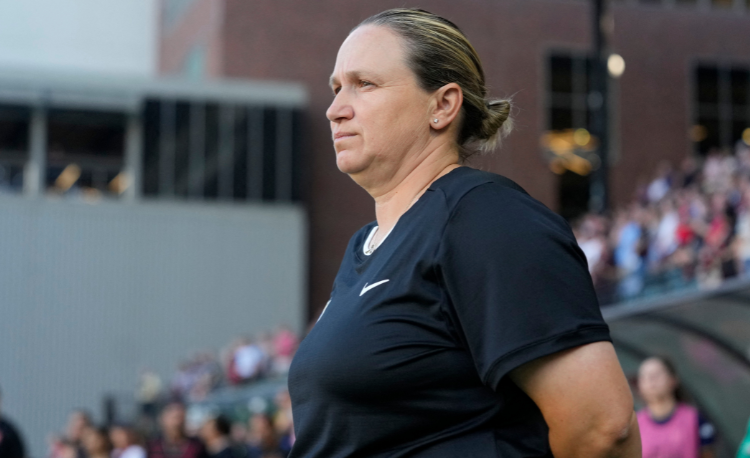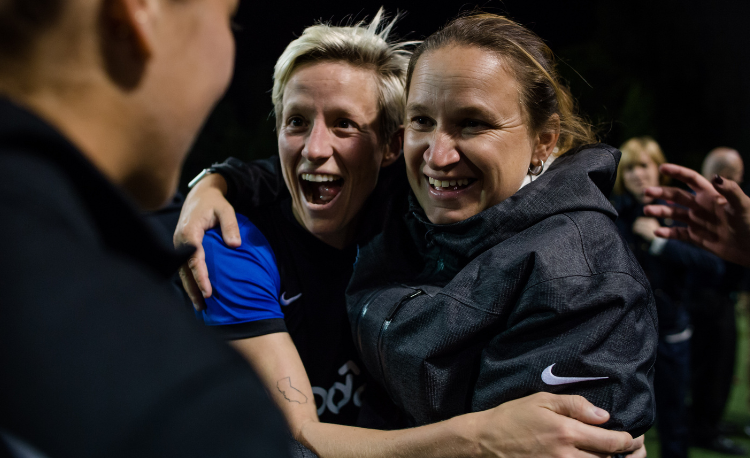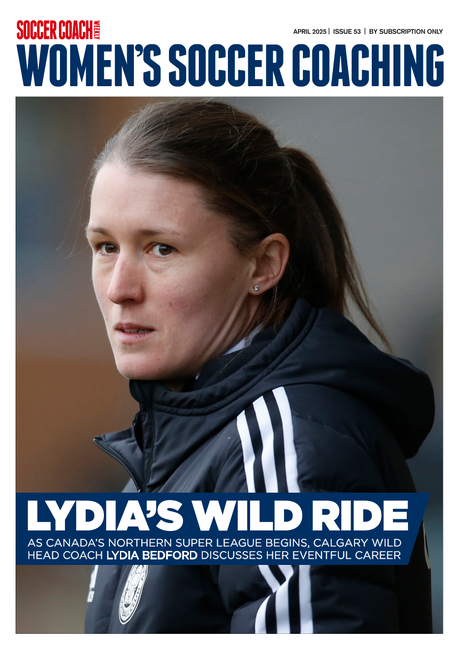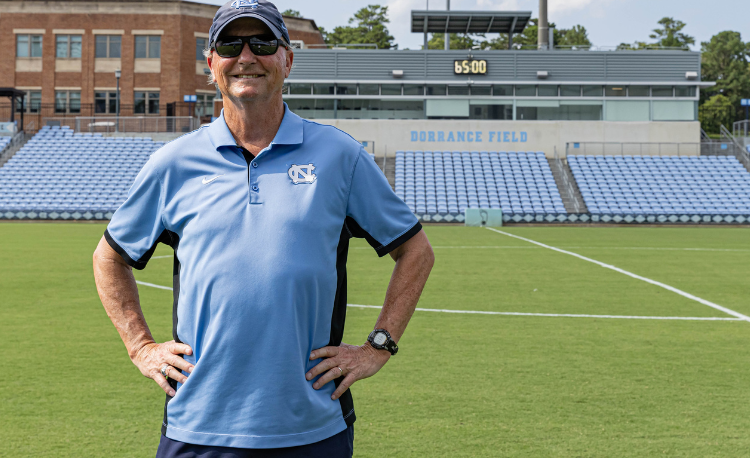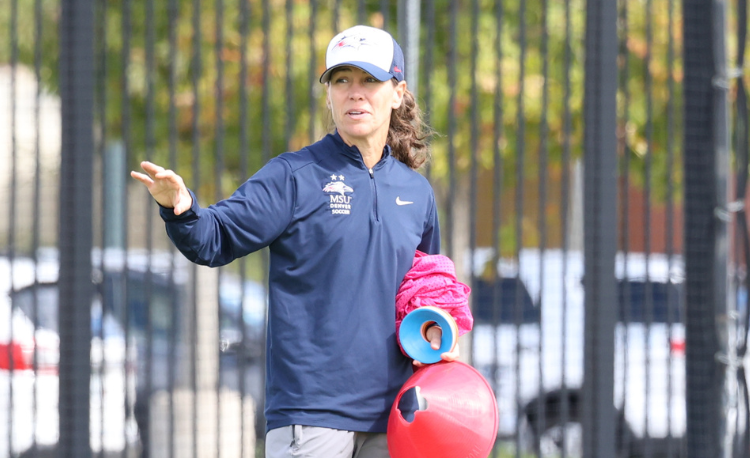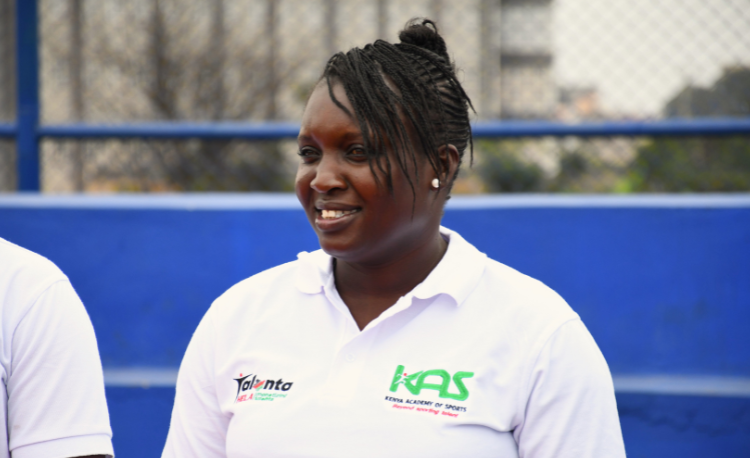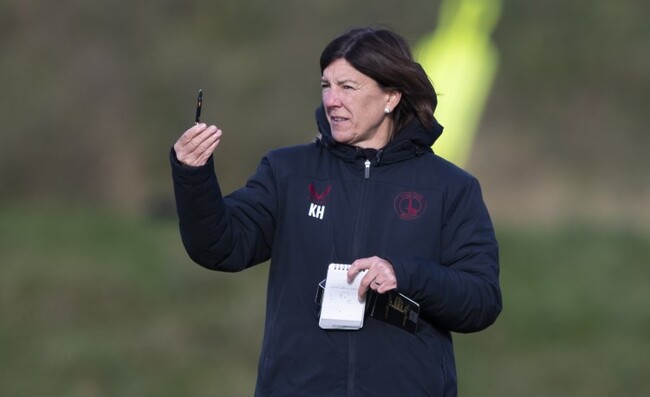You are viewing
1 of your 3 free articles
Laura Harvey: The Reign maker
With silverware at Arsenal and Seattle, Laura Harvey has proved herself a champion on both sides of the Atlantic. She talks to Carrie Dunn about the advice that kickstarted it all and what she tells other women in coaching.
When Laura Harvey was 14 years old – and growing up in the English town of Nuneaton, not far from the city of Birmingham – she told her father she wanted to be a football coach.
He was a PE teacher who worked part-time for the Football Association, looking at talent and academy set-up – and it was he who encouraged Harvey to watch games more analytically.
“We would sit and watch the game,” Harvey told WSC.
“Naturally, the majority of fans just follow the ball, but we’d be having discussions like ‘Look at the centre-forward’s run’ or ‘Look at the movement off the ball’.
“As I got older, I’d be poking him and saying, ‘Look at the centre-forward’s [run]!’, so he was definitely a big advocate for that.
“When you get to 14 and 15, you start to plan out what type of pathway you want to go on, to go to university. I was, like, ‘I want to be a football coach’.
“That was 1994. It just didn’t exist for women in England at the time to have that as a job.
“My dad said, ‘Okay, well, you might want to look at some teaching pathway and just have that as back-up, because you never know, it might not happen.’
“He’ll always say, ‘I’m glad you didn’t listen to me!’.
“There’s some things in life where your parents really want you to listen to them, but that’s one thing he’s proud of me for, for not listening to him about it and just going for it.”
Harvey has gone on to be one of the most successful coaches in elite women’s soccer on both sides of the Atlantic.
In England, she has won three league titles, two league cups and a Women’s FA Cup with Arsenal, between 2010 and 2012. In the US, she has helped current club Seattle Reign to three NWSL Shields.
Harvey has also picked up individual recognition, including a trio of NWSL Coach of the Year awards, and the inaugural FA Women’s Super League Manager of the Year.
She attributes her success across two decades, and two continents, to accepting the ways in which the game constantly changes.
“The game evolves,” she said. “Humans evolve: how they interact, how they need information, how they learn, how the game’s played [evolves].
“I’m very process-driven. I believe in sticking to the way that you believe things should work.
“[Former England head coach] Hope Powell once said to me: ‘Don’t get too high in the highs, and too low in the lows. Be analytical in what you’re trying to do’.
“I really try and live by that. I think that’s helped me to be consistent.”
She says she has two other advantages that have helped her to stay up with the game’s changes and trends.
“One, I’m young still. I’ve been coaching now for a long time, over 20 years, but I’m only 44. A lot of coaches might be in the really early parts of their career at this age, so I feel really lucky about that.
“The other thing I learned at Arsenal, which has lived with me through my coaching career, is to be really authentic.
“When I first took over as head coach, I thought I should change my character and personality, because [I thought]: ‘I’m coaching some friends. I’m now their boss. I need to be this autocratic person’. It’s just not who I am.
“I’ve lived with that forever. That’s been a massive part of my coaching journey; I’m never going to be anyone else. I’m just going to be myself.
“Whenever any coach asks me for a piece of advice, that’s always my number one – just be yourself.”
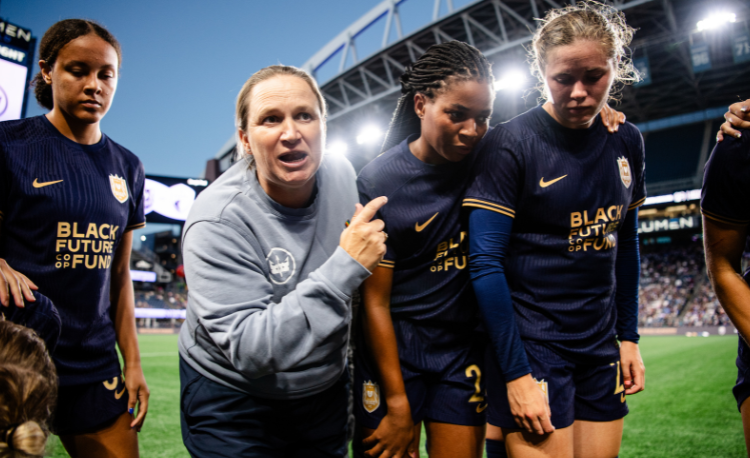
Her coaching career began in earnest in 2002, after injuries – first a torn ACL, then a torn Achilles tendon – forced her to retire from playing. She was 22 at the time.
The women’s game in England at that time was still amateur, and the effort, time and cost required for full rehabilitation was simply too much considering it was her hobby.
“My career at that point was coaching: I was doing girls’ after-school clubs and girls’ centres of excellence.
“Not being able to be mobile was challenging to do my job. When I couldn’t work, I didn’t get paid.
“So, that was when I made the choice that I just wasn’t going to play at any form of level. I just wanted to get myself back where I was active and could actually move around.”
Harvey was, initially, assistant coach at Birmingham City, stepping up to head coach in 2007; before joining London giants Arsenal as first-team coach in 2008 – a challenging move.
“When I went to Arsenal, I’d never second-guessed myself more in my life. I was 28, I’d gone into this superpower of a club, where the resources, the player group, and the expectation around that group, was so different than what I was used to.
“From a coaching perspective, what really helped me was that, while I was doing club football, I was also doing youth international work.
“I got to go to a U17 World Cup in 2008, I did a European Championship in 2010. I worked with all the [England] youth national teams between 2005 and 2011.
“The resources the FA had at the time was so much bigger than what we had at club level: a medical department, video analysts, sports scientists.
“I saw what these departments, and what these specialists, could bring to an environment. I knew we couldn’t afford to have these people in our club, so what I ended up doing was educating myself on it.
“I educated myself on video analysis, data analytics and sports science, so I could try and implement it as much as I could in a club environment, without having the expertise of these specialists.
“That just opened my eyes up. I still today use the same video software that we used then. That’s how impactful it was.
“I was so lucky that I was able to be educated on that stuff and lean on it, because there’s no doubt it helped me.”
Related Files
Harvey still describes Arsenal as “my club” – but she left after two seasons at the helm to join Seattle Reign.
She has been there ever since, save for a two-year spell at Utah Royals between 2018 and 2020.
“Arsenal is a massive club, I was very happy there,” Harvey said. “I felt like we were doing some good things. I wasn’t seeking a move. I wasn’t putting my name in the hat for any jobs out here [in the US].
“I got a phone call one day, and I was sat watching [UK TV soap opera] ‘Hollyoaks’, and my phone rang. It was a number that I didn’t know – it just said ‘Seattle, USA’, and I assumed it was spam’.
“I answered it, and 48 hours later, I resigned [from Arsenal]. It was literally as quick as that.”
Leaving north London for Washington State was emotional, but it is a decision Harvey has never regretted.
“Now, the women’s game is unrecognizable. My career has just gone on a path I never believed it would,” she said.
“I’ve always been really thankful for Arsenal for that, but I’m also thankful for the Reign, for giving me this opportunity first time around.
“They could have gone out and picked anybody to take that job, and I’m really grateful that they chose me.”
When asked if she had any advice for 14-year-old Laura, who wanted to be a coach, Harvey goes back to some of the principles that guide her work now: “Be yourself. Believe in who you are. Don’t shy away from that. Be honest, be vulnerable.”
And she would say the same thing to other female coaches – and women working in other male-dominated fields.
“Be open to any opportunity that comes your way, even if you believe that it’s too much,” she said.
“I believed, at times, that Arsenal was too big of a job for me. But go for it. To women in our line of work, I say this: You might not tick every box that some organisation wants from the person they’re looking for. It doesn’t matter.
“If you believe that that job could be yours, and you would be good at it, absolutely throw your hat into the ring.
“Give it everything that you’ve got, because you never know what opportunity’s around the corner.”
‘don’t rush back’ – empathetic laura’s advice for injured stars
Harvey’s two serious injuries in quick succession, which brought her playing career to a premature halt 22 years ago, has given her an insight into working with players who are dealing with rehab now.
Anterior Cruciate Ligament (ACL) injuries, like the one Harvey suffered, are an all too regular occurence in the women’s game.
In 2024 alone, five Chelsea players suffered ACL injuries: Sam Kerr (left), Sophie Ingle, Mia Fishel, Kadeisha Buchanan and Jorja Fox.
Other WSL players to be sidelined include Liverpool’s Sofie Lundgaard and Everton’s Inma Gabarro and Aurora Galli.
Having suffered the same fate, Harvey can spot the signs.
She said: “I’ll see someone on a pitch do their knee, and, immediately, I’ll go: ‘Oh, they’ve done their ACL’.
“People [will think that] it doesn’t even look like they’ve done anything.
“But trust me: when you’ve done it, you know.
“When I had my ACL operation, in 2002, I was in hospital for four days. Now, you’re in and out in the same day.
“I definitely empathise with people with injuries. I always say to them: ‘Don’t rush back,’ because now it is their career.
“Make sure you get it right, because this can set you up for the rest of your life.”
the wsl was intended to create more competition TO ARSENAL. laura’s BULLISH response? ‘WE’RE STILL GOING TO BE DOMINANT!’
When the Women’s Super League launched in England in 2011, its structure and rules were very different to now – eight semi-professional teams, with roster size limited to 20, salary caps in place and no relegation.
One of the reasons behind its creation was to ensure a more competitive domestic league – and end the long-standing dominance of Arsenal. It gave Harvey and her players even more motivation.
She said: “We knew that for us to be what we wanted to be, we had to lean into that and say: ‘Watch this. We’re still going to be dominant’.
“It just became this insular thing that drove us on.”
One of her big challenges at the time was recruitment, with a flurry of England internationals leaving to sign for teams in the United States.
Harvey had signed some players who became legendary in the WSL: Jordan Nobbs, Steph Houghton, Ellen White and Jen Beattie. Then, when the US league folded, several players wanted to come back to Arsenal – who had won the domestic treble in their absence in 2011.
“Suddenly we had the opportunity to bring Kelly Smith and Alex Scott back – yes please!” Harvey said.
“I remember having a phone conversation, actually, around how we could try and fit them all in.
“I said, ‘Don’t worry about it. Just get them. We’ll be fine!’”.
Newsletter Sign Up
Newsletter Sign Up
Discover the simple way to become a more effective, more successful soccer coach
In a recent survey 89% of subscribers said Women's Soccer Coaching makes them more confident, 91% said Women's Soccer Coaching makes them a more effective coach and 93% said Women's Soccer Coaching makes them more inspired.
*includes 3 coaching manuals
Get Inspired
All the latest techniques and approaches
Women's Soccer Coaching offers proven and easy to use soccer drills, coaching sessions, practice plans, small-sided games, warm-ups, training tips and advice.
We've been at the cutting edge of soccer coaching since we launched Soccer Coach Weekly in 2007, creating resources for the grassroots youth coach, following best practice from around the world and insights from the professional game.
